Against the Storm review - a perfectly chaotic city builder
Cloudy with a chance of mead halls.
This isn't a Game of the Year article, but it could be: from its earliest iteration in Early Access, to its full release now, Against the Storm has become one of my all-time favourites. There are so many points where the concept of a roguelike city builder could wear out - it evades them all with endless, surprising depths. It has become my first choice of what to play when I feel like just playing a game, and despite the time I've poured into it, I'm still - with joyful frustration - learning new things about it.
The premise sees you establishing a series of settlements across the map, your attempts lasting as long as it takes each settlement to either become successful, or for the ominous Scorched Queen to lose her patience and deem the settlement lost. You win a settlement when you have a certain number of reputation points - each point gained removing an impatience one - while the impatience gained slowly over time, and rapidly ticked up when settlers leave or die, means you don't get stuck in a settlement that just won't take. Either way, mine tend to be resolved within an hour or two - just long enough for a single evening session.
Its elevator pitch is an enticing one: a city builder without any slog, where you don't wear out your tried-and-tested strategies, where each session is as new and exciting as the one before. It's a delight to learn that Against the Storm really is all those things - but after spending the better part of a year on it, it feels almost deceptive to say 'this is what Against the Storm is'. There's just so much more to it, offering endless depth and complexity - if you want it.
In the beginning, it feels like your only job is to try to survive in the face of chaos. You gain reputation by filling orders, completing glade events or keeping your settlers happy - but these all require resources that there's simply no guarantee you'll have, or have the ability to craft. Complicated resource pipelines aren't new to city builders, of course, but randomness plays an enormous factor in Against the Storm, particularly in its journey from 'easy to learn' to 'difficult to master'.
Say I want to fill my settlers' leisure needs: I need ale, and a building to drink it in. I need the blueprint for that building, which will roll randomly from a pool of available blueprints. I might be able to buy ale from a trader - if they're offering it, and if I have enough money or trade goods - but otherwise I need another building to manufacture it in, one of three vessels to hold the ale, and either grain or roots to brew. Both grain and roots can be collected in the wild, but if I'm lucky, I've rolled a farm or herb garden to continuously grow my own.
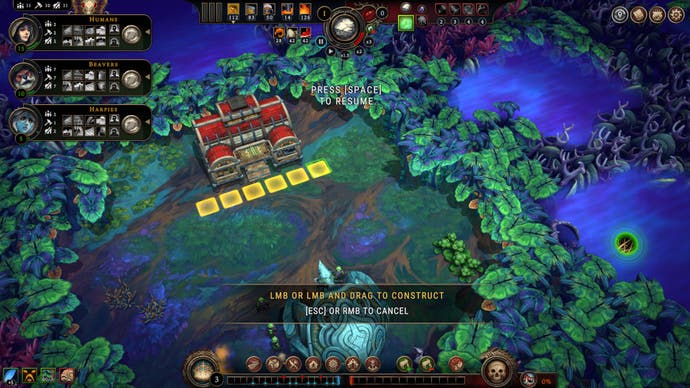
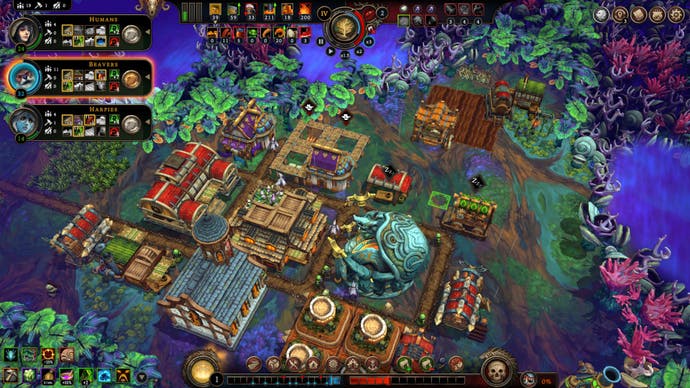
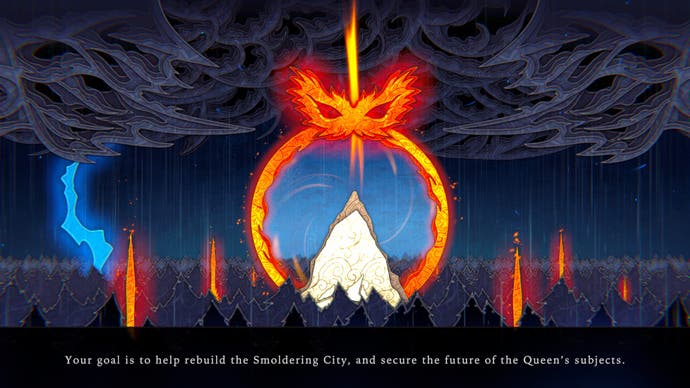
This sounds like utter chaos, and it can be! In plenty of settlements I might never fill this pipeline, or might have everything in place to manufacture ale, but nowhere to drink it. Or maybe a bottleneck of planks preventing me from building the tavern. What changes with time and experience is how you plan around this - if I have the means of producing ale, but nowhere to drink it, am I able to package it up and sell it? Or if I know, at the point of embark, that there's a great deal of farmable soil, should I start with a caravan that includes humans, who love farming and brewing?
It's a thrill to learn how to move from struggling to survive, to synergising with the unique strengths of each settlement - like when you start off in one that offers you free coins at the start of each year as part of its unique buff, for example, and then capitalise on that by rolling a cornerstone that makes traders come more often. In this settlement, at least, it doesn't matter if your ale industry isn't up and running, because your economy is flowing freely.
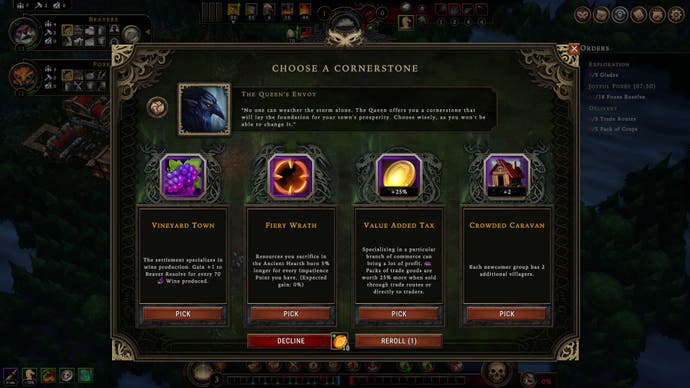

This is helped by the fact that as you spend more time with Against the Storm, there is a permanent progression aspect, so despite all this time I've spent talking about ale, trying to set up that pipeline won't always look the same. As you unlock upgrades that give you new starting blueprints, or the ability to pick new embark bonuses, you get more choices earlier on in a session.
It's another place where I'm charmed by Against the Storm's balance, because the early game isn't unpleasant and grindy, it's just simpler - and you unlock the ability to make more choices as you start wanting to engage with more complexity. There are times when you won't want to give your settlers exactly what they want, or when high impatience levels are a good thing - but that's not a playstyle you're going to start off with.
In fact, it's typically a world map modifier that pushes me into experimenting with these playstyles to start with. Take a settlement where you can't fulfil any royal orders - so that's gone as a source of reputation. Then what? Well, I have to keep my settlers happy, first and foremost, but that can be awfully slow going to start with Meanwhile, the other source of reputation is from glade events - but unlocking glades also raises hostility, which in turn lowers settler happiness during storms. I wasn't gaining any new blueprints until I worked it out, though! And finessing that challenge, and others like it, left me with the skills to push into harder and harder levels.
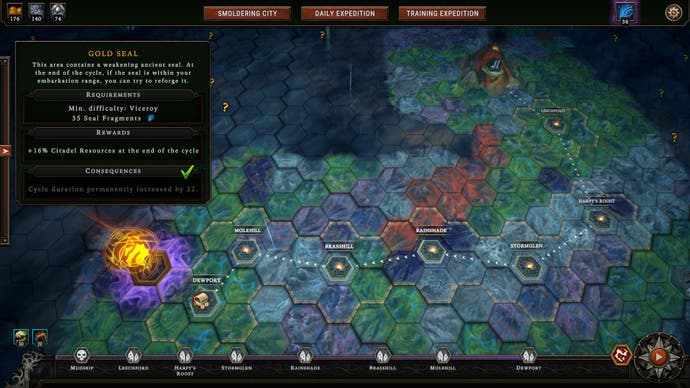
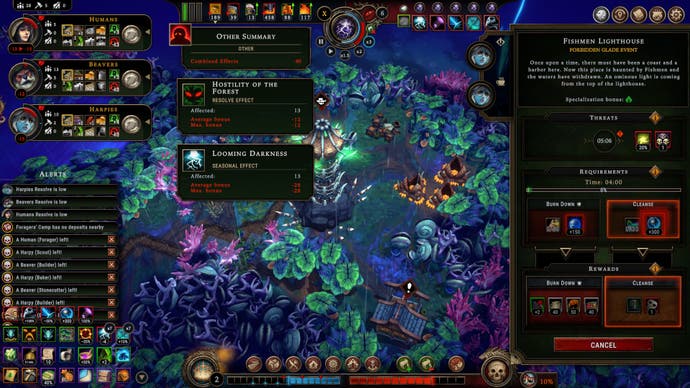
This is because this same sense of progression - of the game becoming more complex with experience - is mimicked across the world map. Each settlement is its own standalone thing, but as you get further from the Smouldering City, and closer to closing a Broken Seal - your intended end goal - the minimum difficulty setting of each settlement raises, and the amount of resources you can embark with dwindles. It's generous in that you can always set your own reward level - you can always play at whatever difficulty you like, low or high, by embarking within particular zones - but the pacing of the challenge is incredibly rewarding.
I'm not a fan of randomness for its own sake - it actively puts me off when I can feel that a game only wants to be grabby with my time and attention. The reason I'm so caught up in Against the Storm is that its random elements, and the information it gives you ahead of time, are in perfect balance. Before I embark, I know what the strengths and weaknesses of the biome I'm entering are - and once I arrive, I know what specific bonuses and difficulties are going to shape my long-term plan. The wild swings of fate all happen within that space.
The best example of this is the impact of hostility and the storms. You don't know what your seasonal buffs and debuffs are before you embark (so you can't pick your goods and caravan around them), but you do know before you start building anything. If I know that at level 3 hostility, all my settlers without complex food have a chance of dying, I can prioritise my food industries long before that would have been a nasty surprise a few years in. These can be things to carefully plan around, or capitalise on - and they're also the cause of many exciting high-adrenaline tactical scrambles when my plans haven't pulled through.
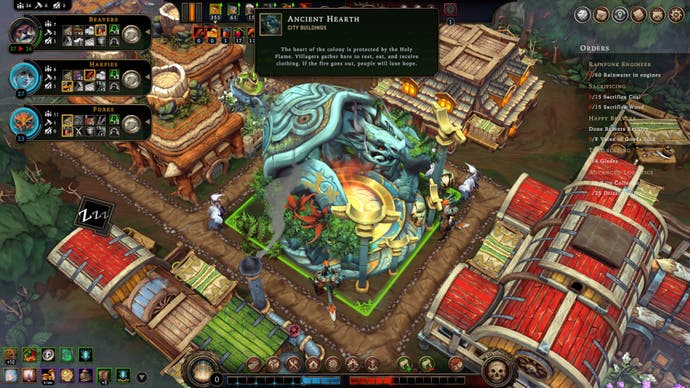
I failed one settlement recently, and knew exactly what mistakes I'd made: I'd forgotten to switch my fuel sources in my hearth, when I knew I needed wood for a hostility tax that would otherwise kill my settlers. Then I chose a glade event that meant I had to spend the whole of the storm putting out fires - even though I needed to do other things during that time to gain reputation. To top it off, I spent the last of my money on pies, which immediately ran out because I forgot to limit them to the only people who would gain reputation from them. I could have recovered from one of these things, but not all three. The settlement snowballed to a collapse, but these were all strategic mistakes in a web of interesting choices unique to this settlement. I've never played a session where I thought the game, or bad luck, or RNG had messed me over.
It's a pleasure to play something where every detail takes you back to the heart of what a game excels at. Every layer of Against the Storm reveals something more compelling than the layer above it - where that layer stands as something already deeply interesting in its own right. The impression I have of it now, while equally positive, is so different to the one I had a year ago. As much as Against the Storm has changed through its time in Early Access, that's more to do with what I've learned alongside it than any significant update. It is one of the most novel and well-crafted city builders I've ever played - one that adapts to its players as much as you adapt to it. Surely the result of both a well-laid plan, and some excellent rolls against chaos.
A copy of Against the Storm was independently sourced for review by Eurogamer.









